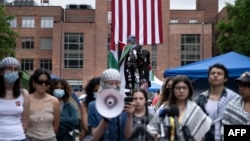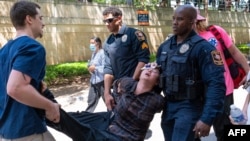In the weeks since protests against Israel's war in the Gaza Strip began on U.S. college campuses, the number of people facing arrest has soared into the thousands.
Police from New York City to Los Angeles have been breaking up protest encampments, sometimes violently, and rounding up demonstrators.
In the United States, where the right to publicly criticize the government and the right to assemble to protest its policies are both enshrined in the Constitution, the dispersal of protests is a sensitive subject.
But while federal law guarantees freedom of speech, that freedom is not unfettered.
Choosing civil disobedience
Over the centuries, federal courts have established that some restrictions on speech, particularly related to the "time, place and manner" in which it is delivered, are legally permissible.
Dating to at least the Civil Rights Movement, members of protest movements in the U.S. have often knowingly and purposefully violated those restrictions, engaging in what is commonly known as civil disobedience.
In states across the country, protesters demonstrating against the war in Gaza have faced a variety of charges, including trespassing and unlawful assembly. Many of those arrested may face jail time, an appearance before a judge and possible legal sanctions. Student protesters may also face internal discipline from universities.
First Amendment binds government
The First Amendment to the U.S. Constitution guarantees Americans' right to free speech and assembly. It reads, "Congress shall make no law … abridging the freedom of speech, or of the press; or the right of the people peaceably to assemble, and to petition the Government for a redress of grievances."
However, it is important to note that the First Amendment only binds the federal and state governments, not private individuals and institutions.
"At a public university, the First Amendment will regulate what that institution can do with respect to protesters," Vera Eidelman, a staff attorney at the American Civil Liberties Union's Speech, Privacy, and Technology Project, told VOA. By contrast, private universities are free to establish their own rules about permissible speech.
"The government can impose content neutral rules, meaning they can't be based on the message that is being expressed by the protesters that reasonably get at the time, place or manner of the protest," Eidelman said.
In practice, that often means limits on things such as using amplified speech late at night and camping out in public spaces.
"Rules like that, that are content neutral and are reasonable and are not aimed at suppressing a message, are generally available for the government to apply," she said.
Not all neutral
Civil liberties advocates have pointed out that some of the enforcement actions being taken against protests appear to be examples of the government acting to shut down particular kinds of speech, which is not permitted under the First Amendment.
In Texas, which has a state law that protects the right of students to protest on campus, Governor Greg Abbott nevertheless preemptively announced that pro-Palestinian protests at the University of Texas at Austin would not be allowed to take place and sent in law enforcement officers to prevent protesters from assembling.
Abbott said he was blocking the protest because it would be "antisemitic" — a claim that civil rights advocates said does not justify suppressing speech.
"We were very concerned about what we saw at UT Austin," Alex Morey, vice president for campus advocacy at the Foundation for Individual Rights and Expression, told VOA.
"We took huge objection to that, because we said, 'This is not you breaking up civil disobedience or keeping the campus safe from violence. You're preempting peaceful protest, and you're saying that it's viewpoint based,'" she said.
Impact of arrests
For the thousands of protesters who have faced arrest over the past few weeks, the consequences can range widely.
In Austin, for example, most of the dozens of protesters taken into custody during Abbott's preemptive raid had their charges dropped almost immediately. They were quickly released from custody after prosecutors found little basis for pressing charges.
However, according to Trisha Trigilio, a senior staff attorney with the ACLU's Criminal Law Reform Project, the impact on other protesters could well be more severe.
In the U.S., police can legally hold a person in custody for 48 hours before they are brought before a judge and formally charged with illegal activity.
"The arrest can be quite violent, and the next few days after arrest when people are held in jail can also be really harmful," Trigilio told VOA. "Protesters could miss work and lose their jobs. There's a lot of students arrested, and they miss important deadlines leading up to finals and graduation. People were arrested towards the end of the month, and rent was due at the time that many people were jailed.
"You'll hear folks in law enforcement talk about being jailed for 'just a few days,' but it's actually really serious," Trigilio said. "These arrests can have really lasting effects."
Various charges
The kinds of charges protesters face vary significantly. Some are relatively minor, with the maximum penalty consisting of a fine. Others, however, face much more serious consequences, including for some of the students arrested at Columbia University, who broke into and occupied a campus building before being removed by police.
"We've seen people charged with felonies," Trigilio said. "Here in New York, people were charged with burglary. It's very common, when you have this kind of emotional back and forth between police and protesters, for police to charge people with resisting arrest or assaulting an officer. Your charges like assault and burglary can be elevated to felonies depending on the jurisdiction you're in."
In the U.S., conviction for a felony can be a serious burden. In some states, felons are deprived of the right to vote, and in many cases, a felony will complicate a person's employment prospects.
But even simply being charged with a felony can be damaging, with many jurisdictions requiring the accused to post cash bail before they are released from custody.
"A recent study showed that most Americans cannot afford a $400 emergency expense," Trigilio said. "And it's very common for cash bail to require payments that are greater than that in order for people to get out of jail."








